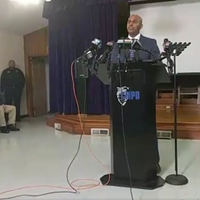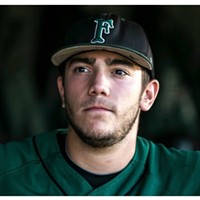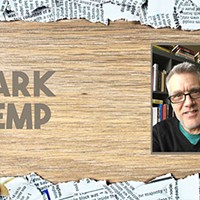Judy Williams is literally tired from all the killing.
I could see it in the way she sat, and in the way she sometimes stared off into the distance when we spoke one recent Saturday afternoon. Williams had held a vigil or memorial of some sort to honor a different Charlotte-area homicide victim on each night of the week leading up to that day, and it sometimes seemed during our conversation as if her mind was racing among the multiple things she had to focus on.
Williams' grandkids waited in her minivan while we sat on a bench outside McEwen Funeral Service. Inside, the family and friends of 14-year-old Taylor Smith held a service in her memory. Following the service, Williams would lead a balloon release to honor Smith in the neighboring Sharon Memorial Park.
Smith, who lived in Charlotte, was shot and killed at a park in Mount Holly on April 3. Police have charged two Charlotte teens, 17-year-old Eric Combs, Jr. and 18-year-old Darvon Fletcher, with her murder. Fletcher is in custody, and police believe Combs is in Ohio with his mother.
"It never gets easier, especially when it's the children," Williams said. "The children are the hardest. We've got a new generation that's starting even younger. This one is 14. She was 14. And the criminals are getting younger and younger."
A co-founder of Mothers of Murdered Offspring [MoMO], Williams has been memorializing Charlotte-area murder victims for 24 years along with her fellow co-founders, Dee Sumpter and David Howard, a former Charlotte City Council member and Williams' son.
Williams has been much busier than normal this year. In the first 100 days of 2017, the 31 killings in Charlotte is more than double the amount seen in the city at this point last year.
There is some inconsistency between that number and the official number of "homicides" recorded by the Charlotte-Mecklenburg Police Department, which is 28. By definition, a homicide occurs when one person kills another person, which has occurred purposefully 31 times in Charlotte this year. However, like most police departments nationwide, CMPD follows the FBI's Uniform Crime Reporting guidelines, which do not count "justifiable homicides" among the total.
The killings of Josue Diaz and Iaroslav Mosiiuk at the hands of CMPD officers were both deemed justifiable homicides by investigators, as was the killing of Phuc Doan in January by the resident of a home he had allegedly broken into.
Even using the CMPD's number of 28, Charlotte is on pace to see about 102 killings this year, a number that would top 100 for the first time since 1993, when police investigated 123 murders, according to stats from the North Carolina Department of Justice.
For someone like Williams, the murders come too fast to keep up with. When I called her on the Friday before we met, she was confused as to which memorial she would be attending on which day for the coming weekend.
"When we get them piled on top of each other like we have lately, it makes it even harder for us to get to all of them," she said the following day. "We don't have but seven days in the week. This is the reason we're doing this balloon release today, because we couldn't fit a candlelight service in. There were no days in the week left.
"It's very overwhelming because you don't want to miss anybody. You want to take care of every family. And sometimes you do miss them. It's overwhelming. It's just overwhelming trying to do this with my life."
It was during that record violent year in Charlotte, 1993, that this life became Williams' reality. Sumpter, a close family friend of Williams and Howard, had just lost her only daughter, Shawna Hawk, in a devastating murder. Hawk had been raped, sodomized and strangled by Henry Wallace, a serial killer who claimed 11 victims before finally being arrested in 1994.
As Williams sat with Sumpter, grieving in Williams' living room, she suggested the trio start a support group for victims going through the emotional trauma Sumpter was experiencing. It was an off-the-cuff idea she thought could help Sumpter refocus her energy during her time of mourning.
"We were trying to really just pull her mind off of this horrific crime that had just happened to her only daughter," Williams says. "I kind of threw that out there, and the next day David said to me, 'You know what, Mama, that might be the thing that will get her through this and manage for us to get her mind off of all this by focusing it on something else.'"
On March 29, just a month and 10 days from Hawk's killing, Mothers of Murdered Offspring held its first meeting.
![[From left] Mothers of Murdered Offspring volunteer Lisa Crawford with founders Judy Williams and David Howard. - PHOTO COURTESY OF MOTHERS OF MURDERED OFFSPRING.](https://media2.fdncms.com/charlotte/imager/u/blog/4309095/founders.jpg)
- Photo courtesy of Mothers of Murdered Offspring.
- [From left] Mothers of Murdered Offspring volunteer Lisa Crawford with founders Judy Williams and David Howard.
Now, even during stressful times like those of late, Williams couldn't imagine life without MoMO.
"People have told us it's because of us they made it," Williams said.
Of course, she would rather be doing something else, but as long as murders are occurring in Charlotte, Williams said she will be there to help support the victims' families and loved ones.
She does not hide from the discomfort and pain her job brings. When asked if it ever gets easier to deal with the devastation left behind by a violent death, Williams spoke with the insight of someone who has been standing face to face with it for more than two decades.
"I don't think it will ever get easier, and I don't want it to get easier. I want it to get easy because it stops. I don't want it to get easy while we're still doing it, because we should never get comfortable with people dying, or people being murdered, lives being taken," she said. "I don't ever want to get comfortable with that. I want it to be as uncomfortable as it can get for me and everybody else I'm around. I don't want people to ease into a state of acceptance, to where we just say, 'Well, that's just life.' No, it's not. I don't want it to ever be just life. I want people to know there's something wrong with this. This is not normal. This is not the way it's supposed to be."
Martine Highet, a victim support specialist with CMPD, shares Williams' dedication. CMPD's Victim Assistance Services [VAS], which Highet heads up, was originally named Homicide Support. It was created by then-Chief Rodney Monroe in 2009 and expanded this year by Chief Kerr Putney to include services for family members who have lost loved ones to circumstances other than murder.
Highet or one of the 19 volunteers who work with VAS, all of whom have lost loved ones to homicides, visit the scene of each homicide to offer their support to the victim's family. They then follow through with services for the family, such as offering counseling referrals or helping them apply for the state's Victim Compensation Services program.
The group also meets as a support group on the first Tuesday of every month. For Highet, it doesn't matter if the number of homicides sits at one or 100, the result is still strikingly sad.
"One is too many. When people focus on the numbers, one is too many, one family is too many," Highet said when I spoke to her in her office at the CMPD headquarters last week. She pointed to a black couch where countless family members have sat in distress over the last eight years. "I hate having families sit here on this couch and us having to talk to them about this tragic event that just happened to them and the aftermath of a homicide. It's just the most horrific day of their life. I wish we didn't need to have so many families sit here."
As stressful as it can be, Highet is comforted by the strength she witnesses in families and communities rallying in support of their own.
"You can get a really good idea of what kind of person the victim was when you meet their family and you meet their extended family," she said. "And some times those extended families are just church members and they come out, and there's beauty in that. You see the beauty in the midst of all these horrific events. You see it when you listen to the families talk about their loved one, what kind of person they were."
Highet also draws encouragement from the overwhelming support she experiences from volunteers and support group members in times like these, when she may be scrambling to keep up with the amount of families in need of help.
"It becomes challenging at times. We want to make sure we meet the needs of all the families," she said. "When we're stretched thin, that's when we rally together — the volunteers and even other members of our police department will say, 'Hey Martine, I know you've got a lot going on, if you need help, let me help.'"
But where is the help coming from, otherwise? For all the talk of violent crime waves and policing during the recent election, community members like Williams and Highet are fighting a losing battle with relatively few people on their side.

- Anthony Frazier had just turned 14 years old when he was murdered in east Charlotte on Jan. 2.
I met Jack Logan in 2014 at a memorial marking the one-year anniversary of Jonathan Ferrell's death at the hands of then-CMPD officer Randall Kerrick. Logan founded Put Dow the Guns Now, an organization aimed at educating young people and their parents on gun safety. I gave him a call last week to get his thoughts on the recent situation, as I know he's familiar with Charlotte and travels here to speak to young people about gun violence on a regular basis. He said his first trip to Charlotte this year came just three days into the year following the murder of Anthony Frazier, a 14-year-old boy shot during an attempted robbery in east Charlotte on January 2.
Despite offering a $20,000 reward for information in the case, investigators have come up empty handed.* When I spoke with Logan, he voiced his frustration that Frazier's killing didn't elicit the same response as Ferrell's. "You've got a bunch of activists up there in Charlotte who will fight the police all day long, but they don't show up for anybody else," Logan said.
Some of Logan's ideas — that if people only respected police they not be mistreated by them, or that more lax gun laws would lead to a drop in crime — haven't led to much progress in this country in the past, but his approach to outreach is effective in that it takes the conversation to the youth in a way that can't be ignored.
"I want to see the people in the city of Charlotte do like we do, on their feet every day," Logan said. "Social media is fine. There's a lot of social media use by the activists up there, but those kids are not your crop of teens that you really need to reach. I feel that being on feet, being in those parks, where some teenagers are just standing around, smoking. I want to see people do that, go on foot. We do it daily, and that's what needs to be done by activists."
While he recognizes the importance of work beig done by MoMA and VAS, Logan said his efforts are different in that he aims to be proactive rather than reactive. Where Williams aims to comfort families in their darkest moment, Logan hopes to reach a kid before that moment comes.
"It's OK to do the candlelight vigils, but the people who go to the candelights, they've lost their loved one, they're hurt. Basically, they don't hear a word you're saying, because at that time they're grieving about the loss of their loved one. You have to catch them prior to something like that, and that's what we do, and that's what I plan to do more of in Charlotte," Logan said. "I'm tired of seeing mothers go to the mortuary to look down on their son or daughter, and this other mother going over to the Department of Corrections for the rest of their life. That's what we're about, trying to prevent those."
To be clear, MoMA and VAS both take part in preventative programs with other organizations in the city. Like Logan, Williams harbors a skeptical view of social media, but for different reasons. In fact, Williams' got visibly upset when she shared her views on how technology has cultivated a disconnect in human relations.
Her voice rose for the first time since I'd met her as she painted a picture of how apps have acted as an alternative to true parenting and cellphones have taken the place of interaction.
"Everybody is so caught up in social media for communication, and I think that's becoming damaging to our society as far as relationships are concerned," she said. "People are created to relate. We are supposed to relate. When people get to where they're not communicating face to face, being touchy touchy, giving hugs, you know, that human touch, I think we lose something. For me, it is asking people to put down those phones a little bit — not just to put down the guns, but put down the phones, too."
That's when the distant stare came back, and I realized how hard it must be to surround yourself with loss as Williams has done so consistently for so long.
When she left Taylor Smith's service, Williams would begin planning and printing materials for the next night, when she would host a vigil for Ruby and Curtis Atkinson, allegedly murdered by their son, who then kidnapped their granddaughter before fleeing the state. The girl had been living with her grandparents since her father's murder earlier. The Atkinson's son was eventually arrested and the girl found safe, though freshly traumatized.
Williams' job would be to comfort what was left of a family ravaged by violence. I asked if she ever felt discouraged in times like these. The question awakened her energy.
"What you have to do is just keep on keeping on. I'm going to keep on as long as there's breath in my body, as long as I'm able to physically, that's how long I intend to continue doing this," she said. "I get discouraged, I still cry at the services, but it's not to the point where I'm going I quit. I'm not going to quit because then, all the years we've put into it are in vain."
At that point, Williams continued about her solemn business for the evening. She led yet another grieving family in releasing a bevy of purple and white balloons into the air while they stood and pondered where to go from there.
As for Williams, she would humbly continue her role as a guiding light while the sun prepared to set, knowing that tomorrow, her work would continue.
*Update: On April 12, just hours after this story was published, CMPD announced the arrests of Mangasha Clark, 19, and Reginald Edmonds, 17, in connection with the murder of Anthony Frazier.




